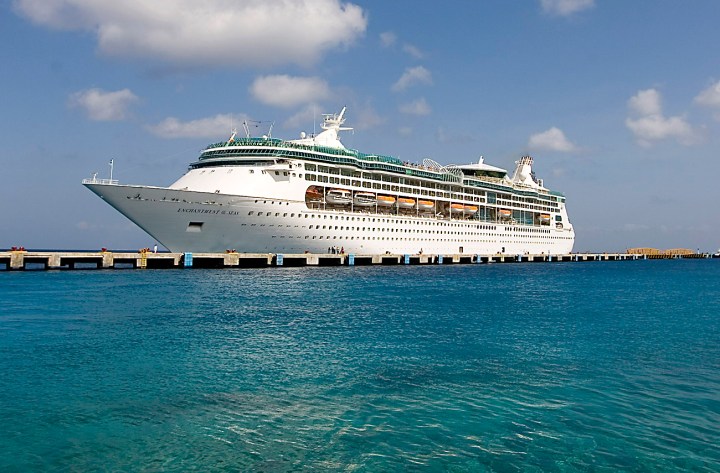Politics
Haiti: cruise ships dock at private beach for fun in the sun

It’s one of those stories that would be edited out of a novel for being too implausible. As Port-au-Prince sinks further into its horrific pit of misery, cruise liners bring vacationers to beaches on the other side of the island.
Cyberpunk news and blogging site Boing Boing filed the story under “business, news, cruise ship, disaster, Haiti, international, tone-deaf corporate assholes”. They weren’t kidding. Turns out that Independence of the Seas, a ship belonging to Royal Caribbean Cruise Lines, dropped anchor on Friday at a private beach in Haiti referred to in the brochures as Labadee. The ship’s guests, protected by armed guards and a 12-foot-high perimeter fence, played in the surf and ate barbecued meat. At sunset they drank cocktails – presumably with little pink umbrellas – and then returned to the vessel.
Able to accommodate 3,634 passengers, Independence of the Seas is one of the world’s largest cruise ships – and also one of the most costly to keep afloat when not running according to strict schedules. Which is arguably why Royal Caribbean Cruise Lines also went ahead with the planned stop at Labadee on Monday of the 3,114-passenger Navigator of the Seas. Today, the 3,634-passenger Liberty of the Seas will anchor off the beach.
A blog post by Royal Caribbean associate vice president John Weis attempted to explain the decision in terms other than his company’s bottom-line. “There were a lot of discussions about [going ahead with the stops],” Weis wrote, “but in the end, Labadee is critical to Haiti’s recovery, and hundreds of people rely on Labadee for their livelihood.”
Happily for the company, the UN Special Envoy of the Government of Haiti, Leslie Voltaire, agreed with Weis. Voltaire had earlier informed Royal Caribbean that the revenue Haiti would generate from upcoming cruise calls would be critical to its recovery.
Another important point in the company’s favour is that – aside from thousands of eager American vacationers – Friday’s ship delivered 40 pallets of water, rice, dried beans and canned foods to the devastated island. Yesterday’s ship reportedly delivered twice as much.
Still, there is one gigantically unavoidable fact about this story, and here it is: the idyllic wooded peninsula with its five pristine beaches that Royal Caribbean Cruise Lines leases from the Haitian government is less than 100 kilometres from Port-au-Prince, the country’s capital. Yesterday, as the cruise line holidaymakers were jumping around in the water, residents of Port au Prince were fleeing their ruined city in droves – and leaving behind their unburied dead.
“Along with everything else stolen by last week’s earthquake,” the New York Times reported, “Haitians must now add another loss: the ability to identify and bury the dead. Funeral rites are among the most sacred of all ceremonies to Haitians, who have been known to spend more money on their burial crypts than on their own homes.”
It’s meaningless, of course, to point out that the price of a one-week first-class Caribbean cruise is easily in the same range as the more upmarket Haitian homes and crypts. The world is full of such glaring inequalities, as South Africans well know. Where meaning does reside, rather, is in the consciousness of the vacationer who “sails” to Haiti at such a time. How, for example, does the ship’s crew keep him upbeat?
We could do worse than look for answers in the work of recently deceased American author David Foster Wallace, who eviscerated the ideal of the Caribbean cruise in his classic essay “A supposedly fun thing I’ll never do again”.
In a long footnote to the essay, Foster Wallace writes about the phenomenon of the Professional Smile, which he terms a “national pandemic” in the American service industry, but especially on board the Nadir, the cruise-liner upon which he once (and only once) toured the Caribbean.
“You know this smile: the strenuous contraction of circumoral fascia with incomplete zygomatic involvement, the smile that doesn’t quite reach the smiler’s eyes and that signifies nothing more than a calculated attempt to advance the smiler’s own interests by pretending to like the smilee. Why do employers and supervisors force professional service people to broadcast the Professional Smile? Am I the only consumer in whom high doses of such a smile produce despair?
“Who do they think is fooled by the Professional Smile?”
Foster Wallace, if he were alive, might be the first to provide an answer to his hypothetical question: every vacationer who’s now visiting Labadee on a ship of the Royal Caribbean line.
By Kevin Bloom
Read more: Boing Boing, USA Today
Photo: REUTERS/Gerardo Garcia





 Become an Insider
Become an Insider